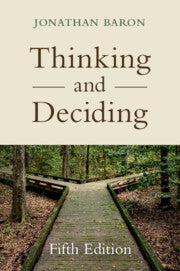Thinking and Deciding
- Unit price
- / per
-
Author:BARON J
-
ISBN:9780521680431
-
Publication Date:October 2007
-
Edition:4
-
Pages:
-
Binding:Paperback
-
Publisher:Cambridge University Press
-
Country of Publication:United Kingdom


A Back Order button means that we don’t have the book in stock at our store. It may already be on order – or we can order it for you from a publisher or distributor at no additional cost.
As we source items from around the globe, a back-order can take anywhere from 5 days to several weeks to arrive, depending on the title.
To check how long this might take, you’re welcome to contact us and we can provide an ETA or any other information you need. We recommend checking the timeframe before committing to an online order.
Thinking and Deciding
- Unit price
- / per
-
Author:BARON J
-
ISBN:9780521680431
-
Publication Date:October 2007
-
Edition:4
-
Pages:
-
Binding:Paperback
-
Publisher:Cambridge University Press
-
Country of Publication:United Kingdom
Description
The fifth edition of the classic text Thinking and Deciding updates the broad overview of the field of judgments and decisions offered in previous editions. It covers the normative standards used to evaluate conclusions, such as logic, probability, and various forms of utility theory. It explains descriptive accounts of departures from these standards, largely in terms of principles of cognitive psychology, emphasizing the distinction between search processes and inferences. Chapters cover decisions under risk, decision analysis, moral decisions and social dilemmas, and decisions about the future. Although the book assumes no particular prerequisites beyond introductory high-school algebra, it is most suited to advanced undergraduates, early graduate students, and active researchers in related fields, such as business, politics, law, medicine, economics, and philosophy.
- Introduces and analyzes the field in terms of normative, descriptive, and prescriptive models and approaches
- Assumes no prior college-level math coursework
- Written as a whole, yet chapters may be used modularly to fit different course outlines
Adding product to your cart
You may also like
A Back Order button means that we don’t have the book in stock at our store. It may already be on order – or we can order it for you from a publisher or distributor at no additional cost.
As we source items from around the globe, a back-order can take anywhere from 5 days to several weeks to arrive, depending on the title.
To check how long this might take, you’re welcome to contact us and we can provide an ETA or any other information you need. We recommend checking the timeframe before committing to an online order.
You may also like
You may also like
-
The fifth edition of the classic text Thinking and Deciding updates the broad overview of the field of judgments and decisions offered in previous editions. It covers the normative standards used to evaluate conclusions, such as logic, probability, and various forms of utility theory. It explains descriptive accounts of departures from these standards, largely in terms of principles of cognitive psychology, emphasizing the distinction between search processes and inferences. Chapters cover decisions under risk, decision analysis, moral decisions and social dilemmas, and decisions about the future. Although the book assumes no particular prerequisites beyond introductory high-school algebra, it is most suited to advanced undergraduates, early graduate students, and active researchers in related fields, such as business, politics, law, medicine, economics, and philosophy.
- Introduces and analyzes the field in terms of normative, descriptive, and prescriptive models and approaches
- Assumes no prior college-level math coursework
- Written as a whole, yet chapters may be used modularly to fit different course outlines
-
-
Author: BARON JISBN: 9780521680431Publication Date: October 2007Edition: 4Pages:Binding: PaperbackPublisher: Cambridge University PressCountry of Publication: United Kingdom
The fifth edition of the classic text Thinking and Deciding updates the broad overview of the field of judgments and decisions offered in previous editions. It covers the normative standards used to evaluate conclusions, such as logic, probability, and various forms of utility theory. It explains descriptive accounts of departures from these standards, largely in terms of principles of cognitive psychology, emphasizing the distinction between search processes and inferences. Chapters cover decisions under risk, decision analysis, moral decisions and social dilemmas, and decisions about the future. Although the book assumes no particular prerequisites beyond introductory high-school algebra, it is most suited to advanced undergraduates, early graduate students, and active researchers in related fields, such as business, politics, law, medicine, economics, and philosophy.
- Introduces and analyzes the field in terms of normative, descriptive, and prescriptive models and approaches
- Assumes no prior college-level math coursework
- Written as a whole, yet chapters may be used modularly to fit different course outlines
-
Author: BARON JISBN: 9780521680431Publication Date: October 2007Edition: 4Pages:Binding: PaperbackPublisher: Cambridge University PressCountry of Publication: United Kingdom
-



